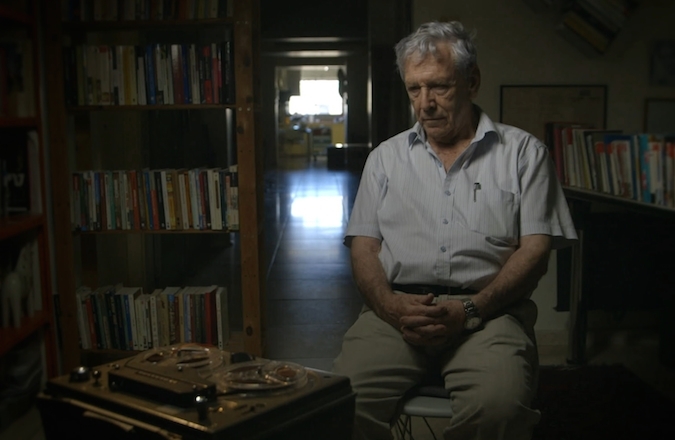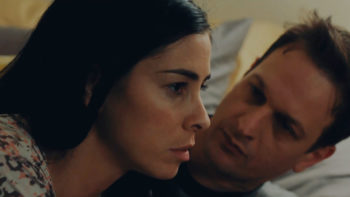
Amos Oz in “Censored Voices” revisits interviews with soldiers he recorded nearly 50 years ago. (Avner Shahaf)
LOS ANGELES (JTA) — Although it’s now well entrenched in the Hollywood ecosystem, the Sundance Film Festival remains a venue for some of the film industry’s more offbeat voices and still largely unknown talent — and a place for boldfaced names to redefine themselves.
Jewish subjects and artists again will figure prominently in this year’s festival, which runs from Jan. 22 to Feb. 1 in Park City, Utah. Here are the films to look for at Sundance:
“Censored Voices” (Documentary)
Just after the Six-Day War in 1967, Amos Oz and fellow kibbutzniks recorded interviews with returning soldiers about their experiences during the fighting. The interviews were largely censored by the Israeli military. In the nearly half-century since, Oz became one of the Jewish state’s most renowned authors of fiction and nonfiction, as well as a prominent opponent of Israel’s presence in the West Bank and Gaza Strip. In “Censored Voices,” Israeli director Mor Loushy revisits the now declassified recordings and the lingering aftereffects of war.
“City of Gold” (Documentary)
Pulitzer Prize-winning food critic Jonathan Gold is an icon in Los Angeles: His recommendations are treated with reverence by foodies, and his reviews can change an obscure noodle shop or greasy spoon into a culinary hotspot. “City of Gold,” directed by Laura Gabbert, follows Gold’s perambulations through the city’s large and diverse food scene, devoting equal care to rickety food trucks and pricey haute cuisine. As befits a man who by his own account received much of his Jewish and culinary training at the city’s delis, Gold is as heimische as his palate is ruthlessly discerning.
“Partisan” (Feature)
Australian Jewish filmmaker Ariel Kleiman, 29, presents his debut feature in his return to Sundance, where his 2011 short “Deeper Than Yesterday” won a Jury Prize and his script for “Partisan” won the festival’s Mahindra Global Filmmaking Award in 2012. “Partisan” stars Vincent Cassel as the leader of a cultish commune who is seeking to protect and isolate his charges from a hostile world. Kleiman co-wrote the movie with Sarah Cyngler, the costume and production designer from “Deeper Than Yesterday.”

Sarah Silverman, shown here with co-star Josh Charles, aims to break out as a dramatic actress in ‘I Smile Back.’ (Eric Lin)
“I Smile Back” (Feature)
Sarah Silverman is a goddess in the world of standup comedy, but she’s never really found her footing in the movies. That may change with her lead role in “I Smile Back,” a domestic drama about a self-destructive suburban housewife who goes off her meds and is sucked into a destructive downward spiral of drinking and drugs. Silverman has publicly spoken about her own struggles with depression, and it will be interesting to see if she can channel her personal history into a potentially career-changing performance. The movie is adapted from the novel by Amy Koppelman, who co-wrote the screenplay, and is directed by Adam Salky.
“Princess” (Feature)
The first full-length feature by Israeli filmmaker Tali Shalom Ezer, “Princess” presents its own vision of domestic strife. The drama delves into a dark subject matter: the abusive relationship between a 12-year-old girl and her stepfather. Shalom Ezer, 36, previously ventured into unsettling territory with the short film “Surrogate,” about a survivor of child abuse who sought sex therapy with a professional sex partner, and the 2005 documentary “Life at Abarbanel,” about life in a mental hospital.
“Larry Kramer In Love and Anger” (Documentary)
Less than a year after the Emmy Award-winning HBO movie adaptation of Larry Kramer’s “The Normal Heart” thrust the 79-year-old playwright and activist back into the spotlight, the new documentary “Larry Kramer In Love and Anger” chronicles the life and career of this controversial and unbending figure. Kramer was one of the loudest and most uncompromising of the gay activists to emerge in the 1980s to publicize and combat the AIDS crisis, which he has often referred to as “a holocaust.” His dogged advocacy helped force the issue onto the national agenda and keep it there.
“How To Dance in Ohio” (Documentary)
Documentarian Alexandra Shiva examines a standard American coming-of-age ritual, the junior prom, through the unexpected lens of autism in “How to Dance in Ohio.” Shiva’s documentary follows a psychologist and a group of autistic teens as they discuss and learn the basics of social interaction in preparation for the social gauntlet that is a high school dance. Shiva previously directed the documentaries “Bombay Eunuch” (2001) and “Stagedoor” (2006). Her maternal grandfather, Jules Stein, founded the entertainment behemoth MCA.
JTA has documented Jewish history in real-time for over a century. Keep our journalism strong by joining us in supporting independent, award-winning reporting.






